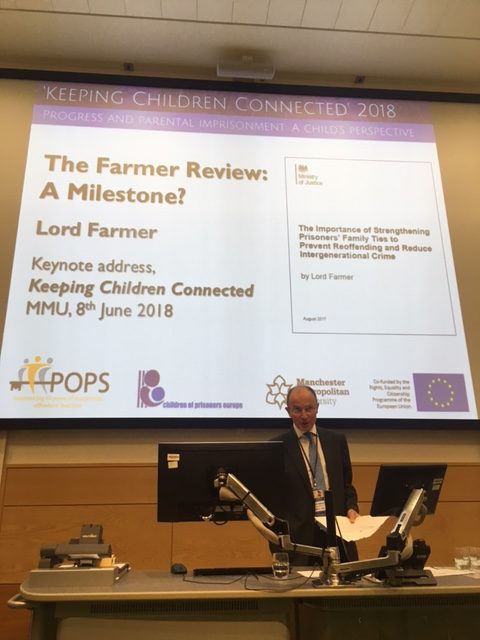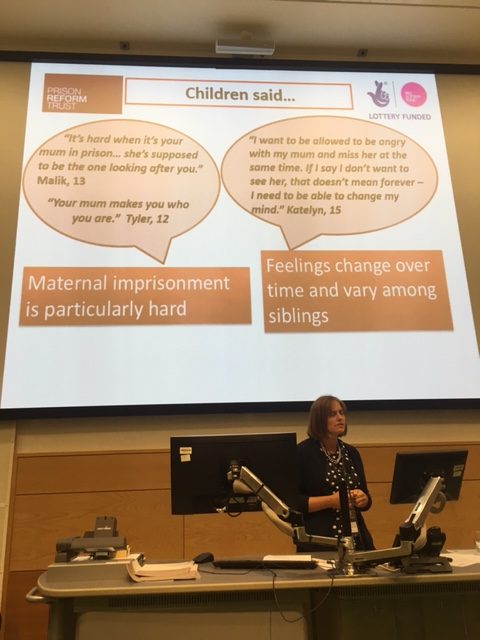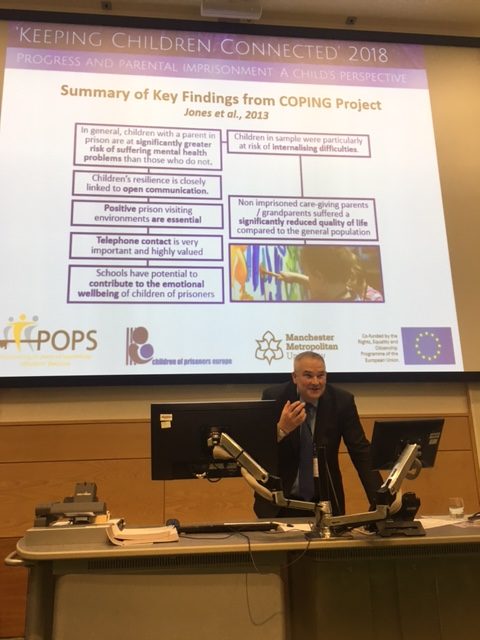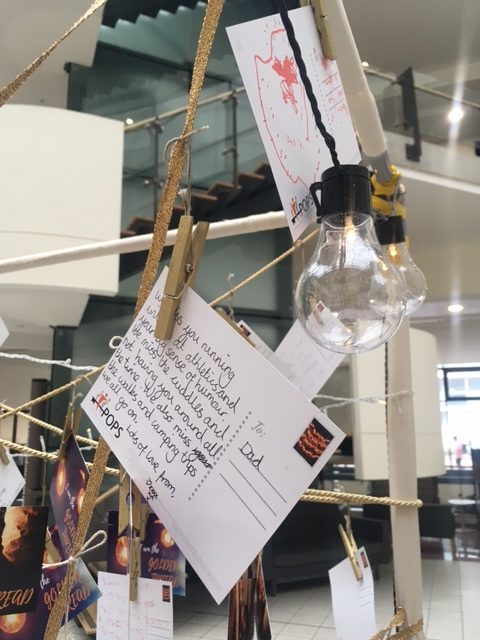Children of Prisoners Europe joined Partners of Prisoners and Family Support Group (POPS) to deliver a conference entitled “Keeping Kids Connected: Progress and Parental Imprisonment, A Child’s Perspective”. Hosted by Manchester Metropolitan University and attended by 131 delegates from 18 different countries, the conference on 8 June was a multi-disciplinary gathering of international and European policymakers, European Parliament members, judges, police and prison personnel, child welfare agencies, child psychologists and civil society organisations. It was composed of presentations and discussions focusing on maintaining the bond between children and their imprisoned parent, as well as examining the interplay of media and communications technology in maintaining that connection.
The framing of this year’s conference diverged from past years in exploring the reciprocal benefits of maintaining familial contacts for the prisoner his or herself. Lord Michael Farmer discussed the rehabilitative effects for prisoners of maintaining family ties, based on a 2017 report published under his auspices, and called for support for children with imprisoned parents through multi-sectoral initiatives for imprisoned parents themselves. The Farmer Review’s primary finding is that prison services and enforcement officers in particular lack discourse—in his words, they lack respect—for the importance of families in a prisoner’s rehabilitation, and standards for maintaining bonds consequently suffer.
The latter portion of the conference included a panel focused on the issue of media’s engagement with the issue of children with imprisoned parents and the role the media has in shaping public discourse about crime, imprisonment, and the stigmatisation of those individuals involved, whether directly or through familial relation. The panelists approached the issue from multiple angles—as media professionals themselves, as academics, from the organisational sector and as politicians—stressing the importance of educating those in the media sector about the effects of their framing and recognising the potential role media might play in shifting public discourse about children with imprisoned parents.
The conference included a number of officials representing the UK’s prisons and police force, who reported on progress on changing attitudes in the prison sector and the importance of supporting family counseling programs in prisons. Baroness Beverley Hughes, Greater Manchester’s Deputy Mayor for Policing & Crime, discussed parental imprisonment as one of several Adverse Childhood Experiences (ACES) that can impact the short- and long-term psychological wellbeing of children, and noted a discursive shift in the traditionally punitive UK context towards a discourse of restorative justice. Corin Morgan-Armstrong, Head of Family Interventions at HMP Parc (Bridgend, South Wales), gave a presentation on their Invisible Walls project, a family-oriented rehabilitation program for inmates approaching the transition out of prison, and noted positive developments for parents and their children, who attended school more regularly and received better marks. In a similar vein, Mark Hanson & Stuart Hall emphasised progress at HMP Lowdham Grange (Nottingham, England), in the provision of a “family link officer” and the possibilities of technology in helping parents to stay in touch with their children.
COPE representatives Liz Ayre and Hannah Lynn presented the recently published Council of Europe Recommendation CM/Rec(2018)5 concerning children with imprisoned parents, a landmark series of recommendations honouring the rights of children of incarcerated parents and establishing standards for the promotion of those rights. The Recommendation includes protocols and obligations for police, prison and justice departments that recognise and uphold the rights of the child while working within a framework that holds the best interests of each child paramount.
Ann Adalist-Estrin urged service providers to honor the “protective factors,” of human connection, personal skills and bonding with an adult as integral to a child’s development of resiliency. From a professional point of view, this means asking questions like, ‘Why might visits be traumatic?’ Focus on providing human-scale programs can aid children in managing the pain of separation and of their own stigmatisation in a healthy way. In the way of media presentation, Ann emphasised the urgency of challenging media portrayals of children with imprisoned parents, calling for a general discursive shift away from talking about the intergenerational cycle of imprisonment to a frame that focuses on child wellbeing.
The conference outcome report linked here is based primarily on delegate presentations, and, in the introductory section, an overview of significant themes and outcomes.






